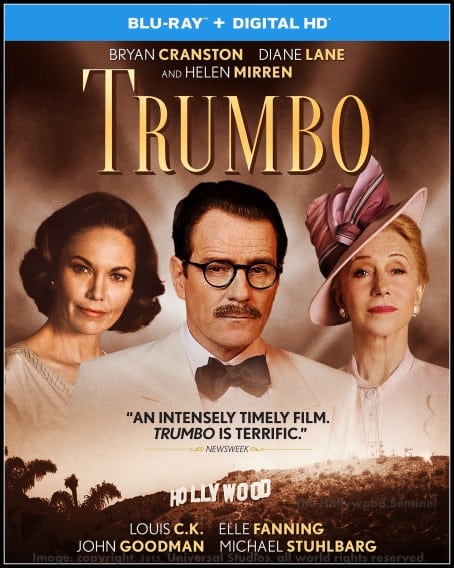Trumbo
A blacklisted Hollywood screenwriter fights back after being jailed for his political beliefs in Trumbo, now on DVD and Digital HD, from Universal Pictures Home Entertainment. Inspired by the colorful life and legacy of the brilliant Oscar®-winning screenwriter Dalton Trumbo (Roman Holiday, Spartacus), Trumbo is an astonishing portrait of an often forgotten chapter of American history. A sharp and timely true Hollywood story, the riveting biographical drama is directed by Emmy Award® winner Jay Roach (HBO’s “Recount,” “Game Change”) and features Emmy and Tony®-winning actor Bryan Cranston.
In 1947, Dalton Trumbo (Bryan Cranston) was Hollywood’s top screenwriter until he and other artists were jailed and blacklisted for their political beliefs. Trumbo (directed by Jay Roach) recounts how Dalton used words and wit to win two Academy Awards and expose the absurdity and injustice of the blacklist, which entangled everyone from gossip columnist Hedda Hopper (Helen Mirren) to John Wayne, Kirk Douglas and Otto Preminger. The film also stars Diane Lane, John Goodman, Louis C.K., Elle Fanning, and Michael Stuhlbarg.
Trumbo is a critically acclaimed film, nominated for an Academy Award® for Best Actor (Bryan Cranston), as well as two Golden Globes®, three SAG Awards, and three Critics Choice Awards.
Star Wars
Star Wars: Episode VIII, began principal photography at Pinewood Studios in London on February 15, 2016. Star Wars: Episode VIII, which is written and directed by Rian Johnson and continues the storylines introduced in Star Wars: The Force Awakens, welcomes back cast members Mark Hamill, Carrie Fisher, Adam Driver, Daisy Ridley, John Boyega, Oscar Isaac, Lupita Nyong’o, Domhnall Gleeson, Anthony Daniels, Gwendoline Christie, and Andy Serkis. New cast members will include Academy Award® winner Benicio Del Toro, Academy Award® nominee Laura Dern, and talented newcomer Kelly Marie Tran.
Star Wars: Episode VIII is produced by Kathleen Kennedy and Ram Bergman and executive produced by J.J. Abrams, Jason McGatlin and Tom Karnowski. Joining the production crew will be some of the industry’s top talent, including Steve Yedlin (Director of Photography), Bob Ducsay (Editor), Rick Heinrichs (Production Designer), Peter Swords King (Hair and Make-Up Designer), and Mary Vernieu (US Casting Director). They will be joining returning crew members Pippa Anderson (Co-Producer, VP Post Production), Neal Scanlan (Creature & Droid FX Creative Supervisor), Michael Kaplan (Costume Designer), Jamie Wilkinson (Prop Master), Chris Corbould (SFX Supervisor), Rob Inch (Stunt Coordinator), Ben Morris (VFX Supervisor), and Nina Gold (UK Casting Director).
Star Wars: Episode VIII is scheduled for release December 15, 2017.
How to Succeed In Hollywood
Bruce Edwin is CEO of the A-list firm Starpower Management LLC, publisher of The Hollywood Sentinel, and also a film producer. His services, based on his years of expertise and success in the music and film industry are sought out and used by some of the most powerful companies and stars in entertainment. This ongoing article series, a precursor to his upcoming book, is his way of giving back to models, actors and bands, with free education- that in its totality and with its unabashed honesty- cannot not be found anywhere else. Free.
How to Succeed As A Screenwriter
1, Know your place and pay your dues by showing respect until you make it big. Until you are an Oscar nominated or Golden Globe nominated or winning screenwriter, realize that the production companies and producers, directors don’t need you, you need them. Don’t act like you are doing them a favor by sending your material or trying to get them to receive it.
2, Be prepared and follow directions given. When a producer or production company has agreed to look at your work, don’t argue or delay. Have ready exactly what they want, which may include a logline, a 1 page synopsis, a 10 page or more treatment, or the full script. Don’t ask them if you can send more than what they ask for, and definitely do not send something not asked for without the OK. This is a good way to get rejected before you even get your material read. Have everything ready right away, so that when they ask for it, you are prepared to send it and send it quickly. I had one screenwriter send me a full script, after I told him to only send me a one page synopsis. That is a quick way to get rejected. If one cannot follow directions on a simple document to send, one can not be expected to follow directions on a more serious and detailed matter like revising a script to someone’s specifications that is paying them. Follow directions.
3, Don’t ask questions before you are hired. After they are looking, or even before they agree to look, don’t ask them questions, which could waste their time and annoy them. A writer recently asked me– when I was going to read some of his work, what the difference was between an agent and a manager, in addition to about a half a dozen other questions, which I simply had no time for. Had he actually researched The Hollywood Sentinel ‘Archives,’ section, or even done a search to this answer online, he would have found the answer to this first question without attempting to waste our time. This is not a question to bother a producer, agent, or manager with. We don’t work on commission for no money down to educate people for free. Although I do educate people for free, when one is trying to get us to rep them, that is not the time to ask questions that one can easily find out on their own. Until you have a contract offer, don’t even hit people up with questions or you could kill the deal.
Can you imagine a guy meeting a girl, and wanting to ask her out, and then saying to her, so, “Will you make out with me a lot?” “Are you a good cook?” “Are you going to treat my children well?” No, she has not even said she will go out with him yet! Don’t do that! it’s too early.
So, when someone is looking or considering looking at your deal, it is not the time to ask them about their percentages, films funded, etc. If you don’t trust their expertise, don’t contact them to begin with, and when you do contact them, asking money questions prior to them even saying they are interested in not appropriate, unless again, you are already a top winning or top nominated screenwriter, in which case you will already have a top agent or top manager, which would mean you would not be asking the wrong questions, the agent or manager would be asking the questions for you, in the right manner.
4, When opportunity knocks, answer the freaken’ door and don’t send them running. One writer had a handful of scripts I was strongly considering representing. I sent him a short contract, and he told me that he needed over month to get back with me to ‘consider’ our deal. He claimed he needed several weeks for his attorney to look it over, and at least several weeks for him to film a webisode, which would include an extra week or so for camping. I told him that was fine, but that I would probably not be interested in giving him more than 10 business days, and that if he considered our business a priority, he could rush his attorney a bit, get a faster one, or cut his camping trip short, if he got no reception in the woods. He refused, and so I rescinded any and all future interest since he did not jump at the huge opportunity we were giving him. He was shocked, even though I gave him ample time to change his mind and move quicker. Over a year has passed, and no one has heard of this guy since, and my guess is, probably never will. When you have an A-list deal fall on your lap, do all you can to make it happen as fast as you can, and show them that you are eager, and appreciative. If you delay, you may delay your success for ever.
5, Thank the person! If you get an call or visit or e-mail from a top producer, agent, manager, or director, thank them for their time! My first test of whether or not I will deal with someone, is their manners or lack thereof. I have major investors– worth millions to sometimes even billions of dollars, that graciously thank me for my time, simply because they are classy ladies and gentleman, and are highly cordial and polite, when in fact, I should be the one thanking ‘them,’ and I always do. So when a writer hears from me, and does not thank me for my time, or show gratitude, I automatically lose all respect and interest.
6, Use the persons name, and address them as Mr. or Ms. unless they tell you to otherwise. Show respect. Just when I think I’ve seen it all, I often experience some other scenario that tops the rest in all manners of ridiculousness. As an example, another writer recently contacted me with no thank you, and actually instead of calling me by any part of my name, addressed me as the letter ‘B’! Not only is this lazy, it’s foolish. Pretend you are communicating with the person face to face. Show respect, and use their name.
7, Don’t give orders. If you are trying to get someone to do something for you, or to communicate with you, or return your communication, ask them, don’t order. Most rich or powerful people have worked very hard to get where they are at, and a part of that freedom they enjoy is not having to take orders from anyone. So, if someone gives them an order, especially when that person is trying to get a favor out of ‘them,’ they can generally forget a deal ever happening. Ask, don’t demand! And that’s an order! (LOL).
8, Answer your phone, and answer blocked calls. Any time someone that wants me to do something spends their time telling me about how they did not answer my call, because they don’t answer blocked calls, not only wastes my time, but sends me the signal that they are either A, control freaks, B, paranoid, or C, have bill collectors after them. I have told this story over and over, but unfortunately, it is one that needs repeating. Atlantic Records called me one time from New York, and the publicist there told me, “Bruce, record labels and film studios, we all call from private, blocked, or even dummy numbers. So if you want to be successful working in Hollywood in the music and film biz, answer private calls!”
I told this story about the blocked line and dummy number to an actress I represented once who was not answering our blocked line, and she asked me if I was calling her a dummy. I had to think about that one. I thanked this person at Atlantic Records for that advice, and always took it, and it was true. Every film studio lot I have had an office at, has phones that we had to use through the studio that had automatically programmed private or dummy numbers. The record labels are no different. This has been this way for ages, and is to protect producers and top level industry people from stalkers, and is also so we can better control our communication and ‘roll calls’ without interruptions we don’t want, controlling communication on our terms. So, answer your phone, and always answer private calls or numbers you don’t know and don’t complain about it. Complaining about this does not impress anyone, on the contrary, it will only show that you have no experience in dealing with the entertainment industry.
9, Don’t describe your film as a cross between one film and another, unless you are asked to compare it. One writer I know just emailed me a synopsis and described his film as when one title meets another certain film. The first film he mentioned I had never even seen, not liking the actor in the film, and the second film he compared his script to, I had seen, and after reading his script, found this comparison totally wrong, being nothing like the film mentioned. Further, why be ‘like’ another film anyway? Be original, and don’t compare your script to anything else unless you have to.
10, Don’t send producers you are working with or want to work with countless re-writes! One writer I am dealing with is constantly sending me revised versions of his script, which I simply have no time to read. Then, one funding source will have one version, and another funding source ends up with another version, then when we go back to discuss it, it has totally changed, and is a complete mess. This is a sign of an unprofessional screenwriter. turn in a final draft, and stick to it, unless you are asked to change it otherwise.
11, Proofread! I got another writer that sent me a script in with a ton of typographical errors. He had the audacity to tell me I could clean them up. No! That is not a producers job, it’s the screenwriters. Make sure that your script is perfect, and error free.
12, Don’t try to act like a producer on a film when you are not the producer, and are the screenwriter only. Your job is essential and important. I am not demeaning that job whatsoever. Just don’t try to overstep your boundary and act like a line producer or producer unless you actually are one, and have been retained by the owner or producer of the deal to work in this additional capacity.
I hope this has helped many of you. As always, if you have any questions, you are invited to contact me at the front page of this site.
The office of Bruce Edwin and Starpower Management accepts screenplays from Academy Award or Golden Globe winning or nominated screenwriters only.
This content is © 2016, The Hollywood Sentinel, Bruce Edwin, all rights reserved. Special thanks to Universal Studios and Skywalker Ranch.











